october  2008
2008
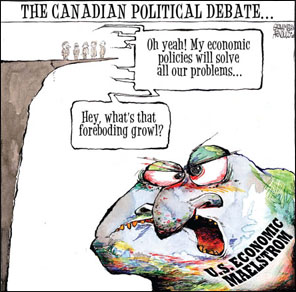 Just a few more things — somewhat disjointed and, at least in one case, already outdated — but just about as relevant as anything I ever post...
Just a few more things — somewhat disjointed and, at least in one case, already outdated — but just about as relevant as anything I ever post...
This item, by The Georgia Straight's political cartoonist Grahame Arnould, ran in the local Vancouver paper the week before Canada's election on October 14th. I think it sums up pretty nicely the relationship between the two countries in terms of election coverage in the media. I just realized the five little people on the branch might not be immediately recognizable so, to clarify, yes we have five parties in Canada — they're all allowed on the ballot in every single province and they're all (well... except maybe the Bloc Quebecois) accepted as legitimate parties all across the country. We even have a female Green Party candidate, just like our friends south of the border.
And, yes, she too gets beaten up by the supposedly liberal press for "siphoning off" votes from the larger parties that "actually have a chance of winning," just like Cynthia McKinney and Ralph Nader before her.
I liked that cartoon so much I actually cut it out of the paper and stuck it next to my big old retro 1999 indigo imac. Heh.
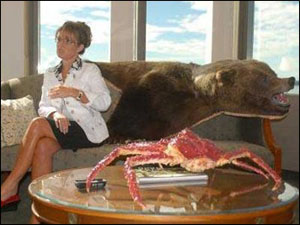 Have you seen the pictures or video footage of Sarah Palin giving some sort of interview where she appears to be sharing the sofa in her office with a giant dead grizzly bear? I almost thought I had imagined seeing it in a video clip a little while back but, sure enough, this morning I did a search (that's right: "palin + dead bear") and here it is. How fucking creepy is that? Cruella and the Cryptkeeper '08.
Have you seen the pictures or video footage of Sarah Palin giving some sort of interview where she appears to be sharing the sofa in her office with a giant dead grizzly bear? I almost thought I had imagined seeing it in a video clip a little while back but, sure enough, this morning I did a search (that's right: "palin + dead bear") and here it is. How fucking creepy is that? Cruella and the Cryptkeeper '08.
I think it's an important time to remember, no matter what happens next Tuesday or any other Tuesday, that this is, after all, a mutually agreed-upon consensus reality game that our collective souls signed on for. We are but avatars in this vast, somewhat flawed simulation. In the immortal words of Bill Hicks:
"The world is like a ride in an amusement park. And when you choose to go on it, you think it's real because that's how powerful our minds are. And the ride goes up and down and round and round. It has thrills and chills and it's very brightly colored and it's very loud and it's fun, for a while. Some people have been on the ride for a long time and they begin to question, is this real, or is this just a ride? And other people have remembered, and they come back to us. They say, "hey - don't worry, don't be afraid, ever, because, this is just a ride..." And we... kill those people. Ha ha — "Shut him up. We have a lot invested in this ride. Shut him up. Look at my furrows of worry. Look at my big bank account and my family. This just has to be real."
Just a ride. But we always kill those good guys who try and tell us that. You ever notice that? And let the demons run amok. But it doesn't matter because it's just a ride. And we can change it anytime we want. It's only a choice. No effort, no work, no job, no savings and money. A choice, right now, between fear and love. The eyes of fear want you to put bigger locks on your doors, buy guns, close yourself off. The eyes of love, instead, see all of us as one. Here's what we can do to change the world, right now, to a better ride. Take all that money that we spend on weapons and defenses each year and instead spend it feeding and clothing and educating the poor of the world, which it would many times over, not one human being excluded, and we could explore space, together, both inner and outer, forever, in peace."
Continuing on the election theme (if you can't beat 'em...), here are a few more fun things.
First, the issues — 72 of them, in fact: Candidate Positions on 72 Issues: A Side by Side Comparison at Pro-Con.org. Their Electoral History page is even more interesting (if less visually so) than 538.com's. Don't miss the "did you know"s at the bottom of the page, including tidbits like number three:
"A presidential candidate has won the election despite losing the popular vote four times in US history: 1824, 1876, 1888, and 2000. In 1824, John Quincy Adams lost both the popular and the electoral vote, but the House of Representatives decided the outcome of the election because his opponent failed to secure a majority of electoral votes."
When you hear the words "Electoral College," do you wince because: a) you have enough angst about all the potential obstacles to voting — disenfranchisement, suppression, caging, purging, flipping and hacking — that the last thing you need is to be reminded of the system that all but renders the popular vote irrelevant; or because b) you know you should have learned all about it in high school — but then, it was an American public school so you can't be sure — but anyway, the last thing you need is to be reminded that it either went over your head or you weren't paying attention or you've just plain forgotten. Well, they never explained it this concisely, I promise you. Here's "Electing a US President in Plain English," from The Commoncraft Show:
Speaking of disenfranchisement, I was wondering about this during the Canadian election last week. We got voter cards in the mail telling us where to go, when to go and what to bring (ID and proof of address, the latter apparently being a new requirement). This immediately made me wonder how someone who's homeless could possibly not be disenfranchised by this requirement, especially considering that the cards are mailed in the first place. I wonder if you'd have to vote absentee... and how fucking ironic would that be?
We are now entering the "sucking undertow" phase of the lead-up to Election 2008, two weeks where time will seem to expand and contract simultaneously and we will feel like we're being forced to assimilate the same volume of experiences every day that, just a decade ago, would have taken... let's say a week.
I can only imagine the extreme level of saturation that the looming event, now only 13 days away, must be receiving on television south of the border. It's bad enough up here — but, at least now that our election is over, the Canadian media can get back to reporting all the details of McCain v. Obama without stooping to apologetically explain the obvious fact that the US election is exponentially more newsworthy — and, for the most part, in the real sense of the word.
So, what else is there to do but take all this election crap that's been cluttering up my subconscious, sweep it into a pile and make my humble donation to the fervor?
Have you tried glassbooth.com? This site, according to its clever developers, "connects you to the 2008 presidential candidate that represents your beliefs the best." Not that anyone could possibly be undecided at this point but it's always nice to be able to solidly quantify your convictions... especially when it means filling out a fun personality test.
For an up-to-the-minute count of the votes that will "really" (as opposed to really) count, check out the technical marvel that is fivethirtyeight.com, a site that tracks the 538 votes of the Electoral College. The site's mission is "to accumulate and analyze polling and political data... to give you the best possible objective assessment of the likely outcome of upcoming elections." Being a history geek, I found the Electoral History Charts particularly fascinating.
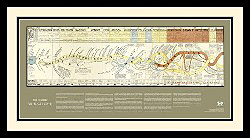 Speaking of history, History Shots has an interesting visual timeline of the political parties from 1730 to 1892, "a high-quality reproduction of an original antique print created circa 1894 by an unknown designer. The diagram vividly depicts the birth and death of each party as streams flowing across the graphic." There's also a History of the Parties Part 2 that takes us through 2005 (no mention of how soon they expect to be shipping the post-Election '08 edition).
Speaking of history, History Shots has an interesting visual timeline of the political parties from 1730 to 1892, "a high-quality reproduction of an original antique print created circa 1894 by an unknown designer. The diagram vividly depicts the birth and death of each party as streams flowing across the graphic." There's also a History of the Parties Part 2 that takes us through 2005 (no mention of how soon they expect to be shipping the post-Election '08 edition).
Now that early voting has started, we're already getting reports of touch screen machines misfiring, which just means that this time we won't have to wait until after the election to start fighting about whether Diebold or Acorn, Ohio or Florida, the Elephants or the Asses are stealing the election. Yet again, it seems that "The Simpsons" was prescient on this matter (if you haven't seen the "leaked" scene featuring Homer's trip to the polls, it's worth watching).
 Why isn't there an international commission on US elections? I mean, if the international community can rally a coalition of observers to ensure the fairness of elections in Iraq, Kenya and Haiti, why can't they do so for the (still, I think) Most Powerful Nation on Earth?
Why isn't there an international commission on US elections? I mean, if the international community can rally a coalition of observers to ensure the fairness of elections in Iraq, Kenya and Haiti, why can't they do so for the (still, I think) Most Powerful Nation on Earth?
I say they just do what the other failed states do and go with the purple finger method, forgo the play-by-play on the 24-hour news networks — or, what the hell, let them report from the counting rooms — hire an army of laid-off bankers and brokers to count them up by hand (in bipartisan teams of two, obviously), then announce the winner once all the actual votes have actually been counted. Somebody should really think about "bringing democracy" to the United States.
A few months ago, Best Free Documentaries, one of my favorite sites for finding videos online, featured a long excerpt of a presentation by Dmitry Orlov provocatively titled Closing the 'Collapse Gap': the USSR was better prepared for collapse than the US. I've been thinking about it a lot lately, since all my Internet and iTunes news sources have been consumed by the melodramatic machinations of Congress and the investment banking industry.
[Photo by Shawn O'Boyle]
 Originally presented in December 2006, Closing the 'Collapse Gap' outlines the signs and stages of collapse that are common to all empires, comparing the former Soviet Union to the present-day United States and analyzing the observed and presumable impacts of collapse on their respective economic, social and political infrastructures. As the title suggests, the citizens and systems of the United States seem uniquely ill-prepared to face the end of empire, an eventuality which appears to be increasingly imminent.
Originally presented in December 2006, Closing the 'Collapse Gap' outlines the signs and stages of collapse that are common to all empires, comparing the former Soviet Union to the present-day United States and analyzing the observed and presumable impacts of collapse on their respective economic, social and political infrastructures. As the title suggests, the citizens and systems of the United States seem uniquely ill-prepared to face the end of empire, an eventuality which appears to be increasingly imminent.
"The subject of economic collapse is generally a sad one. But... I believe that, with a bit of preparation, such events can be taken in stride... [I]t seems that there is a fair chance that the U.S. economy will collapse sometime within the foreseeable future. It also would seem that we won't be particularly well-prepared for it." — Closing the 'Collapse Gap' by Dmitry Orlov.
As a US citizen who grew up in the Soviet Union, Orlov has a perspective that is relatively unfamiliar to most North Americans and this makes his side-by-side comparison of the 20th century's Superpowers in their final phase of Empire more fascinating than frightening. He begins by pointing out several similarities that might not be obvious to those living in the West and by reminding us of the areas in which the two nations were rivals — the Space Race, the Arms Race, the Missile Gap — and finally, he proposes, "the Collapse Gap."
 One of the most interesting points of comparison demonstrates the ways that the communist state-run infrastructure, although frustratingly inefficient at the peak of empire, actually became advantageous after the economic and political systems had failed. Soviet citizens were already accustomed to restrictions and shortages so, when the currency suddenly dropped in value and commodities like food, medicine and other basic consumer goods became increasingly scarce, they did not face the kind of shock that Americans, accustomed to total freedom of infinite choice, would under similar circumstances.
One of the most interesting points of comparison demonstrates the ways that the communist state-run infrastructure, although frustratingly inefficient at the peak of empire, actually became advantageous after the economic and political systems had failed. Soviet citizens were already accustomed to restrictions and shortages so, when the currency suddenly dropped in value and commodities like food, medicine and other basic consumer goods became increasingly scarce, they did not face the kind of shock that Americans, accustomed to total freedom of infinite choice, would under similar circumstances.
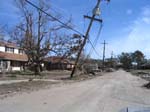 A society that is able to make the most of what they have, repairing and patching as opposed to tossing and replacing things that break or wear out, will find it much easier to manage a period of financial hardship. Furthermore, when a government loses it's financial stability, public utilities and services grow more and more unreliable; a population that is already accustomed to putting up with inconveniences and delays will be better equipped to deal with a protracted crisis inevitably marked by fuel shortages and interruptions to public services. Orlov points out that housing and transportation are two of the areas where the capitalist "ownership society" has made its citizens most ill-equipped for a collapse:
A society that is able to make the most of what they have, repairing and patching as opposed to tossing and replacing things that break or wear out, will find it much easier to manage a period of financial hardship. Furthermore, when a government loses it's financial stability, public utilities and services grow more and more unreliable; a population that is already accustomed to putting up with inconveniences and delays will be better equipped to deal with a protracted crisis inevitably marked by fuel shortages and interruptions to public services. Orlov points out that housing and transportation are two of the areas where the capitalist "ownership society" has made its citizens most ill-equipped for a collapse:
"In the Soviet Union, all housing belonged to the government, which made it available directly to the people. Since all housing was also built by the government, it was only built in places that the government could service using public transportation. Soviet public transportation was more or less all there was, but there was plenty of it. There were also a few private cars, but so few that gasoline rationing and shortages were mostly inconsequential. All of this public infrastructure was designed to be almost infinitely maintainable, and continued to run even as the rest of the economy collapsed." — Closing the 'Collapse Gap'
The corresponding situation in the United States, a nation of suburban islands separated by thousands of miles of cold, indifferent concrete, hardly needs restating; the nightly news is already sounding the siren, screaming of home foreclosures, layoffs and bank failures; consumers enslaved by debt, a health care crisis and rising gas prices.
 Even more dangerous than the infrastructure gap is the fact that the characteristics most helpful to surviving a collapse are those that many Americans are famously lacking in: self-sufficiency, creativity, the willingness to learn new skills, to adapt and share resources; general good health and fitness but especially independence from costly medications; finally, emotional fortitude and the support of friends and family. These qualities were abundant in the Soviet Union and they helped survivors to suffer the slings and arrows of fortune with something between zen detachment and wry acceptance.
Even more dangerous than the infrastructure gap is the fact that the characteristics most helpful to surviving a collapse are those that many Americans are famously lacking in: self-sufficiency, creativity, the willingness to learn new skills, to adapt and share resources; general good health and fitness but especially independence from costly medications; finally, emotional fortitude and the support of friends and family. These qualities were abundant in the Soviet Union and they helped survivors to suffer the slings and arrows of fortune with something between zen detachment and wry acceptance.
One of Orlov's last pieces of advice is to detach yourself from the economy as much as possible before the systemic breakdowns begin to impact you; the less you cling to the diseased structures of empire, the more you will be insulated from injury when it all comes down.
"It is traumatic to go from a high income to little or no income... If the economy, and your place within it, is really important to you, you will be really hurt when it goes away. It takes a lot of creativity and effort to put together a fulfilling existence on the margins of society. After the collapse, these margins may turn out to be some of the best places to live." — Closing the 'Collapse Gap'
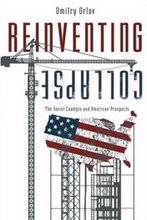
In a recent entry on his web log, Orlov characterizes last week's $840 billion bailout thusly:
"It is not about making anyone here happy: the fascists think that smells of socialism, the socialists think that it smells of fascism, and everyone (except for Bush, Paulson and Bernanke) agrees that it smells. Some people would like to see some heads roll, but as Robespierre discovered in the course of the French revolution, that just puts you knee-deep in headless aristocratic corpses, still with neither bread nor cake to feed to the peasants." — Dmitry Orlov, cluborlov
[Order or read an excerpt from Reinventing Collapse by Dmitry Orlov.]
[Color photos by Nicholas Radley. See his New Orleans photo gallery.]